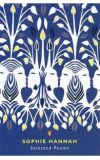
22 May 2013 15:04:02
There you go: a little token for Sophie Hannah, as a confectioner might present a cupcake to a master pâtissier. Now let's have the real thing, addressing a similar concern: "He's highbrow in a big, big way/But when he sees that I'm/The one, he'll think that it's okay/For poetry to rhyme." That's from "When a Poet Loves a Composer", and in the previous stanza she'd confessed to hiding from the beloved her notion that music should have "a tune".
And if there is room for the haunting melodies of Wallace Stevens, or the teasing near-tunes of John Ashbery, or the sonorous but occasionally baffling organ-notes of Geoffrey Hill, then there is room for the spiky, memorable, catchy tunes of Sophie Hannah.
At some early point in her development, she must have seen a Wendy Cope collection and thought: that's for me. Isn't it funny how men don't write like that? Though sometimes Kingsley Amis did, and even answered that question in "Something Nasty in the Bookshop": "We men have got love well weighed up; our stuff/Can get by without it./Women don't seem to think that's good enough;/They write about it." There may well be a nod towards the bookshop setting of Amis's poem when Hannah says, in "Before Sherratt & Hughes Became Waterstone's": "I've seen a few customers looking dismayed, /Too British to voice their objection,/But how can I help it? I like to get laid/Just in front of the poetry section."
If you do not laugh at that then there is little or no hope for you. It is, mind, one of the few poems that doesn't seem to be cross with men. If you are a swain contemplating the gift of this book to your inamorata, you had better be very confident in the solidity of your character and the strength of your love. Hannah, or her poetic persona, would appear to have a knack for attracting the Wrong Type of Man, and she dissects them forensically. (I gather she is better known as a writer of psychological thrillers.) That her wit, and the very form she writes almost all of her poetry in, give her pronouncements the oracular force of inevitability will not make you feel any easier, however much you want to applaud her for rhyming "Casablanca" with "wanker".
As Amis said: "And the awful way their poems lay them open/Just doesn't strike them./Women are really much nicer than men:/No wonder we like them." Among her parade of Unsuitable Men the poet walks, herself not entirely the most Suitable of Women, but not afraid to say so. In "A Fairly Universal Set" – she is also very good at titles – she lists all the people she is jealous of: "Your enemies, and most of all, your exes,/Everyone you have ever seen or met ..." Incidentally, poetics fans, it's a Shakespearean sonnet, a form she does rather well.
You should by now be getting the idea that what she does, she does very well indeed. And just because the poems tend towards the rumpty-tumpty-tum, this does not mean they cannot cover a wide range of emotion or expression. It is, indeed, the very art of choosing and placing the words that makes the poem go rumpty-tumpty-tum and invites our attention and respect.
"My top-note is frivolity/But beneath, dark passions guide me" – coming from a poem, this is not an assertion we should take purely at face value, but it's something we should consider. So: love the frivolity – I don't think I've read a more charming poem that takes advantage of a regional linguistic quirk than "Wells-Next-the-Sea" ("I came this little seaside town/And went a pub they call The Crown", etc) – but also love the passion beneath it. Just because something makes you smile, or laugh out loud, doesn't mean it isn't deep.

